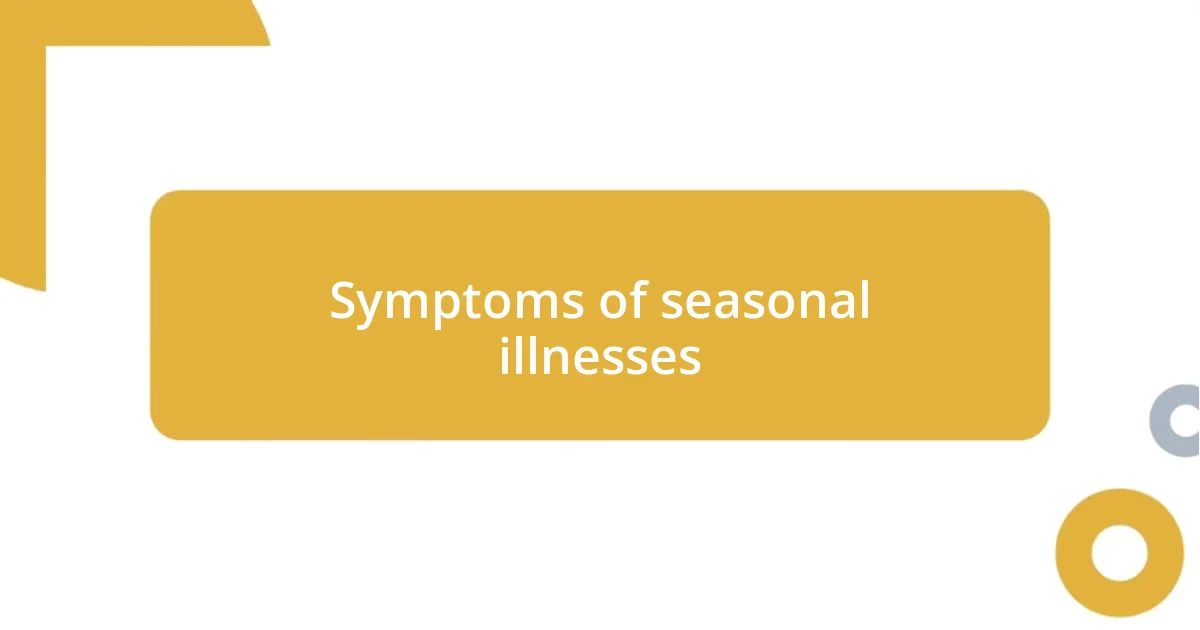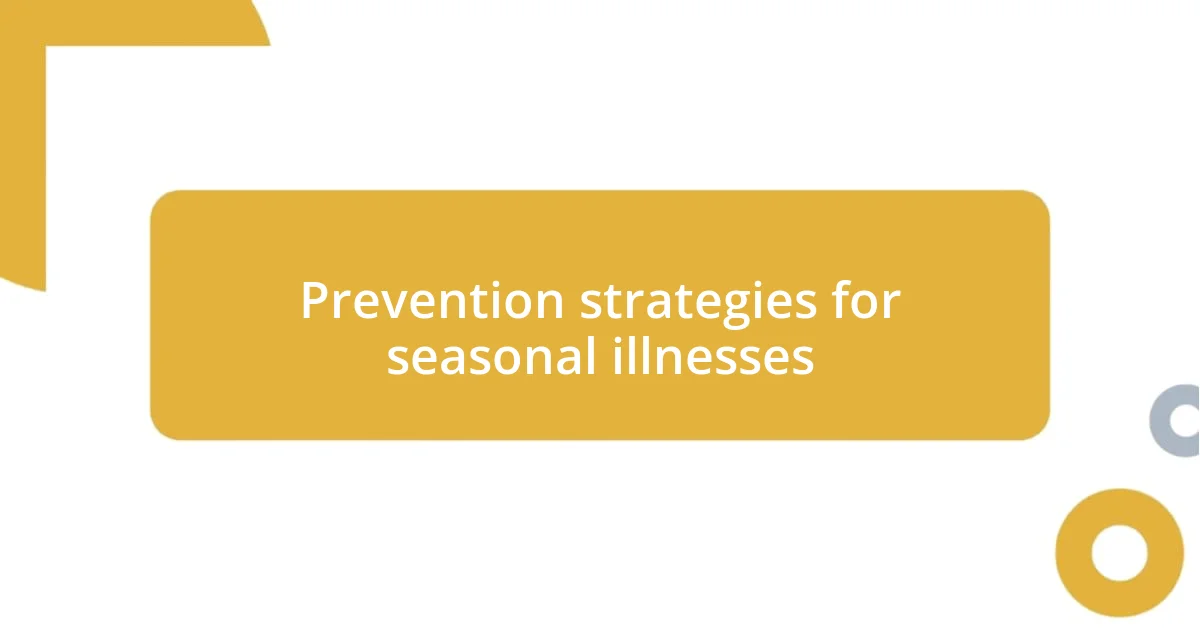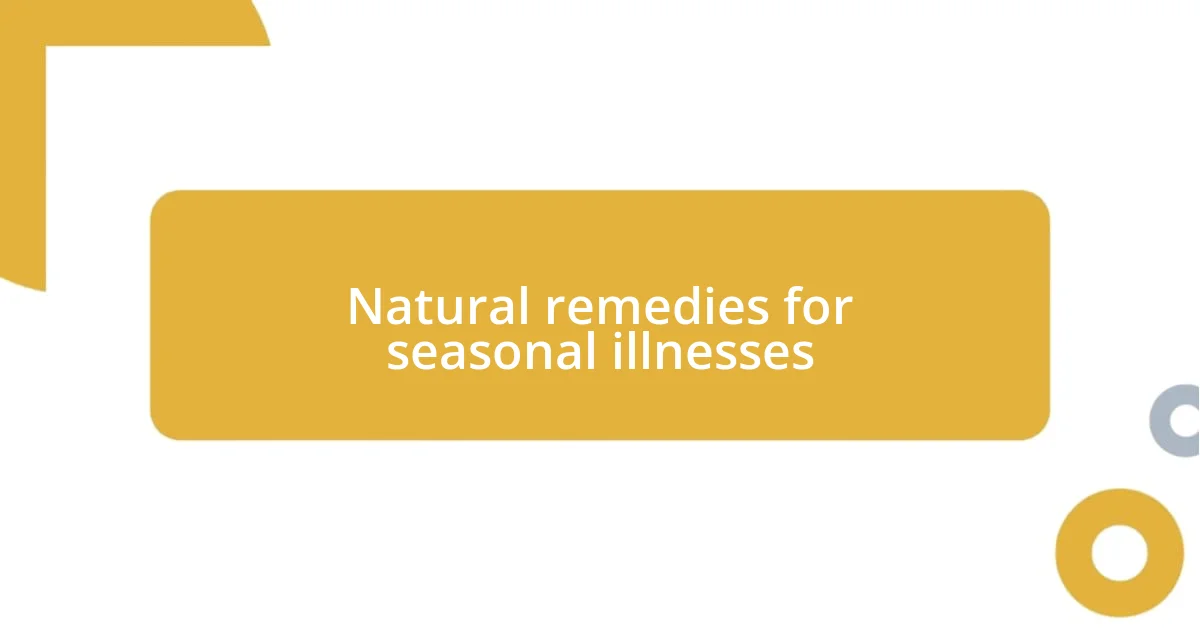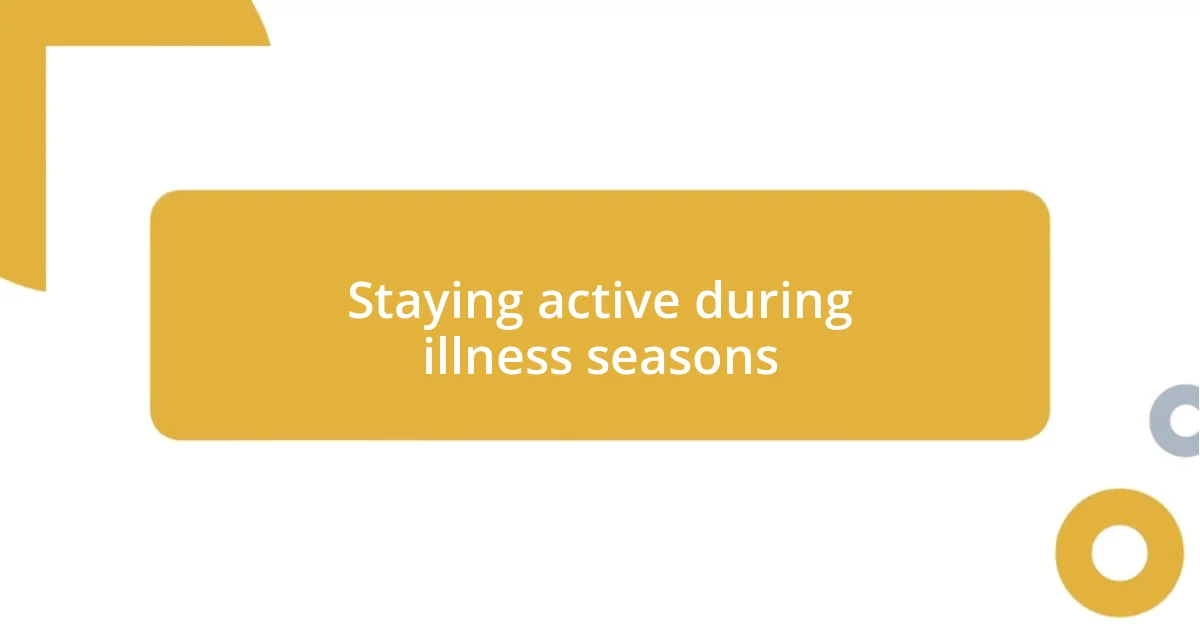Key takeaways:
- Seasonal illnesses are influenced by environmental factors like pollen levels and loss of Vitamin D during winter, affecting our immunity and health.
- Preventing seasonal illnesses involves regular handwashing, monitoring pollen forecasts, and maintaining a healthy diet rich in nutrients.
- It’s essential to recognize when to seek medical advice, especially if symptoms persist or disrupt daily life, as ignoring them can lead to more significant health issues.

Understanding seasonal illnesses
Seasonal illnesses, such as colds and allergies, often arise during specific times of the year, triggered by various environmental changes. I remember feeling particularly miserable one spring when my allergies kicked in, leaving me with a constant stuffy nose and watery eyes. Have you ever experienced that all-too-familiar itchiness that signals the approach of allergy season?
Understanding why these illnesses occur requires a glance at things like pollen levels, weather changes, and even viral outbreaks that seem to pop up like clockwork. I was surprised to learn that the shift from winter to spring not only brings beautiful blooms but also a surge in outdoor allergens. It’s fascinating how our bodies react to these fluctuations, don’t you think?
Moreover, our immunity can be affected by seasonal changes; for instance, cold winter months often lead to fewer sunny days and less Vitamin D, making us more susceptible to illness. I find it intriguing how something as simple as sunshine plays such a crucial role in our health. Have you ever noticed a difference in your energy levels with the seasons? It’s something worth pondering as we navigate the ups and downs of these cycles.

Symptoms of seasonal illnesses
When dealing with seasonal illnesses, the symptoms often hit like an unwelcome guest. I remember one particularly frustrating autumn, where the constant sneezing and itchy throat made it feel like I was in a perpetual state of discomfort. It’s astonishing how these symptoms can disrupt daily life, leaving you feeling drained and irritable.
Common symptoms I experience include:
– Sneezing
– Runny or stuffy nose
– Itchy or watery eyes
– Coughing
– Sore throat
– Fatigue
Each of these symptoms can develop gradually or hit you all at once, often making it challenging to distinguish between a simple cold and an allergy flare-up. The sore throat I had when I caught a cold last winter lingered longer than I expected, reminding me how interconnected these conditions can be. It’s a bit of a rollercoaster, isn’t it? You think you’ve got it figured out, only to find yourself second-guessing with every itch or sneeze.

Prevention strategies for seasonal illnesses
When it comes to preventing seasonal illnesses, I’ve found that a proactive approach is essential. For example, incorporating a daily routine of washing my hands regularly has significantly reduced my exposure to germs. It’s a simple habit, but it really makes a difference, especially when cold and flu season hits. Have you ever noticed how just a moment of care, like scrubbing your hands, can shield you from those pesky viruses?
Staying informed about pollen forecasts and air quality can also guide my daily activities. I’ve learned to check these factors, especially during high pollen days when my allergies tend to flare up. For instance, I try to limit outdoor activities during these times, which helps me stay comfortable. Perhaps you’ve experienced the relief of avoiding triggers that leave you feeling miserable?
Finally, maintaining a healthy diet plays a pivotal role in strengthening my immune system throughout the changing seasons. I prioritize foods rich in Vitamin C, like oranges and leafy greens. A few years ago, I experimented with adding more garlic to my meals after reading about its immune-boosting properties. Honestly, I believe it not only enhanced the flavor but may have also kept those colds at bay! Have you ever integrated specific foods into your diet to prevent seasonal sickness?
| Prevention Strategy | Personal Practice |
|---|---|
| Regular Hand Washing | Helps reduce germ exposure |
| Pollen Forecast Awareness | Avoids allergy triggers |
| Healthy Diet | Boosts immunity with specific foods |

Natural remedies for seasonal illnesses
There’s something incredibly soothing about turning to nature for relief from seasonal illnesses. One remedy that I swear by is honey, especially local varieties. Not only does it taste divine in hot tea, but I’ve noticed that it also helps soothe a scratchy throat and acts as a natural cough suppressant. Have you ever tried it? You’d be surprised at how much of a difference a spoonful can make, particularly during those rough patches when every cough feels like a tiny battle.
Another remedy that’s become part of my routine is the use of essential oils. During the sniffly months, a few drops of eucalyptus oil in my diffuser work wonders for clearing my sinuses. I vividly remember a rainy day last winter when I felt congested and uncomfortable; by simply breathing in that fresh, invigorating aroma, I was able to find relief and focus on my tasks. It’s such a small change, yet it’s incredibly effective. Do you have a favorite scent that helps you feel rejuvenated?
Herbal teas, particularly ginger and chamomile, also play a crucial role in my natural remedy toolkit. Brewing a warm cup not only helps me hydrate but also brings about a sense of calm during moments when I’m feeling under the weather. I often find myself curling up with a cozy blanket and savoring that warmth, letting the herbal benefits seep in. Have you ever taken a moment to indulge in a comforting tea ritual? It can be such a delightful way to nurture your body and spirit during those seasonal transitions.

Importance of a healthy diet
In my experience, a healthy diet isn’t just about eating well; it’s about fueling my body for the challenges of each season. I remember a particularly chilly winter where I committed to adding a colorful variety of fruits and vegetables to my meals. The vibrancy on my plate not only made my meals more exciting but also packed my body with essential nutrients. Have you ever felt the difference in your energy levels just from focusing on nourishing food?
When cold and flu season rolls around, I can’t stress enough how important it is to embrace foods that promote immune health. I’ve found myself turning to hearty soups, loaded with cruciferous veggies like broccoli and kale. The warmth is comforting, yes, but it’s the nutrients working overtime that give me that reassuring sense of security. Do you have a go-to dish when you feel the chill of the season creeping in?
Moreover, staying hydrated is an often-overlooked aspect of maintaining a healthy diet. I recall a summer where I underestimated the importance of water, only to find myself feeling sluggish and fatigued. A simple adjustment, like carrying a water bottle with me everywhere, transformed my energy levels significantly. It’s astonishing how something so fundamental can make such a powerful impact. Have you ever thought about how well you hydrate during seasonal changes?

Staying active during illness seasons
Staying active during illness seasons can feel like a daunting task, but I’ve discovered the magic of small movements to boost my spirits and immunity. On particularly chilly days, I often choose to take short walks around the neighborhood, even if it’s just to feel that brisk air on my skin. There’s something invigorating about being outside, breathing in fresh air, and embracing nature—have you ever noticed how a quick stroll can lift your mood and clear your mind?
I also find that engaging in light indoor exercises keeps me not only physically active but mentally refreshed. Yoga, for instance, has become my go-to practice. I remember one cozy afternoon, feeling especially under the weather, when I rolled out my mat and took a moment for deep breathing and gentle stretches. It turned my heavy, lethargic feelings into energized calmness. Have you ever tried incorporating mindfulness and movement into your routine when feeling low?
Maintaining a routine of light activity becomes essential, even when the weather tries to keep us indoors. I’ve learned to listen to my body; some days a short dance session in my living room feels right, while on others, a few simple bodyweight exercises do the trick. It’s about finding that balance that supports my well-being. What activities help you stay active during those challenging seasons? Finding what works best for you can make all the difference in managing both body and spirit during those flu-filled months.

When to seek medical advice
When it comes to knowing when to seek medical advice, I’ve learned to listen closely to my body’s signals. For instance, if I notice persistent symptoms like a high fever or difficulty breathing, I don’t hesitate to reach out to my healthcare provider. After a few experiences of trying to tough it out, I realized that taking my health seriously is the best way forward. Have you ever ignored symptoms only to wish you had acted sooner?
Another critical moment for me is when symptoms start interfering with my daily life. There was a time when what I thought was just a simple cold lingered for weeks, leaving me exhausted and unproductive. That’s when I recognized the importance of addressing symptoms that disrupt my routine. It made me wonder, how often do we brush off signs that things aren’t right because we feel we can tough it out?
Lastly, I can’t stress enough the importance of not dismissing unusual symptoms. I remember a time when I had unexplained fatigue and persistent headaches that didn’t improve. I scheduled an appointment, and it turned out my body was trying to tell me something important. Don’t ignore what your body is saying; it could be your most valuable guide in determining when it’s time to seek help. Have you ever had a similar experience where your health was trying to communicate something vital to you?














